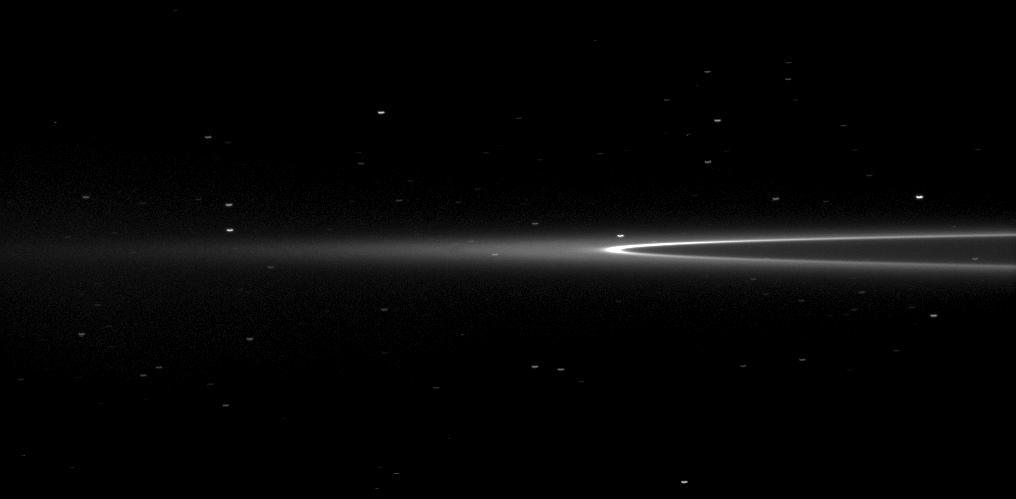See new, spectacular, or mysterious sky images.
-
bystander
- Apathetic Retiree
- Posts: 21587
- Joined: Mon Aug 28, 2006 2:06 pm
- Location: Oklahoma
Post
by bystander » Tue Aug 02, 2011 5:40 am
Eye Toward Aegaeon
NASA JPL Cassini | 2011 Aug 01
The Cassini spacecraft looks toward Saturn's tiny moon Aegaeon within the G-ring arc.
The moonlet Aegaeon (formerly known as S/2008 S 1) can't be seen in this image, but it orbits in the bright arc of Saturn's faint G ring shown here. See
Tiny Moonlet Within G Ring Arc to learn more.
Many background stars are visibly elongated by the motion of the spacecraft during the image's exposure. This view looks toward the northern, sunlit side of the rings from just above the ringplane.
The image was taken in visible light with the Cassini spacecraft narrow-angle camera on July 4, 2011. The view was acquired at a distance of approximately 2.5 million kilometers (1.6 million miles) from Saturn. Image scale is 14 kilometers (9 miles) per pixel.
Know the quiet place within your heart and touch the rainbow of possibility; be
alive to the gentle breeze of communication, and please stop being such a jerk. — Garrison Keillor
-
owlice
- Guardian of the Codes
- Posts: 8406
- Joined: Wed Aug 04, 2004 4:18 pm
- Location: Washington, DC
Post
by owlice » Fri Feb 01, 2013 8:23 am
NASA |
JPL-Caltech |
Cassini Solstice Mission |
CICLOPS | 2013 Jan 21
Moons at Work
The ring-region Saturnian moons Prometheus and Pan are both caught "herding" their respective rings in this image. Through their gravitational disturbances of nearby ring particles, one moon maintains a gap in the outer A ring and the other helps keep a ring narrowly confined.
Prometheus (53 miles, or 86 kilometers across), together with Pandora (not seen in this image), maintains the narrow F ring seen at the bottom left in this image. Pan (17 miles, or 28 kilometers across) holds open the Encke gap in which it finds itself embedded in the center. The bright dot near the inner edge of the Encke gap is a background star.
This view looks toward the unilluminated side of the rings from about 29 degrees below the ringplane. The image was taken in visible violet light with the Cassini spacecraft narrow-angle camera on Sept. 18, 2012.
The view was acquired at a distance of approximately 1.4 million miles (2.3 million kilometers) from Pan and at a Sun-Pan-spacecraft, or phase, angle of 98 degrees. Image scale is 9 miles (14 kilometers) per pixel.
Credit: NASA/JPL-Caltech/Space Science Institute
First posted
here.
A closed mouth gathers no foot.
-
bystander
- Apathetic Retiree
- Posts: 21587
- Joined: Mon Aug 28, 2006 2:06 pm
- Location: Oklahoma
Post
by bystander » Fri Mar 01, 2013 8:56 pm
Mysterious Umbriel
Planetary Society | Ted Stryk | 2013 Feb 28
Umbriel, a moon of Uranus, is about 1200 kilometers across. It is less reflective than the planet's other moons, except for mysterious bright features: one seen on the rim of what appears to be a crater, and the central peak of another. It was imaged by Voyager 2 in January of 1986, at a resolution of 10 kilometers per pixel in the two images snapped at closest approach. Unfortunately, one of the images was underexposed and slightly smeared, and the other was properly exposed but very smeared.
My processing of the images a few years ago, which can be seen here, was focused around desmearing and bringing out detail. This is all well and good, but the artifacts from such processing made it, well, ugly. While there are other views that include more images and were less smeared/underexposed, they were much more distant, making them frustratingly small. I decided to start from scratch, reprocessing the two highest resolution frames, combining them at 125% of their original size, and creating a color overlay from more distant images. Having refined some of the techniques I used in 2009 and trying to avoid overextending the processing, I have created a version that is much more beautiful and perhaps gives us an idea what Umbriel really looks like.
Since it will be at least another decade, and probably much more, before we see Umbriel close up again, it is unlikely to give up its secrets any time soon.
Know the quiet place within your heart and touch the rainbow of possibility; be
alive to the gentle breeze of communication, and please stop being such a jerk. — Garrison Keillor


